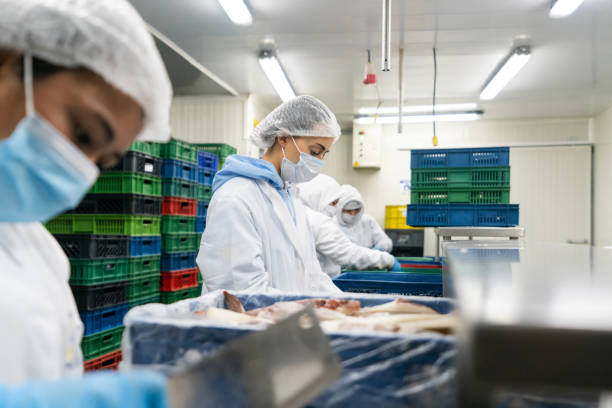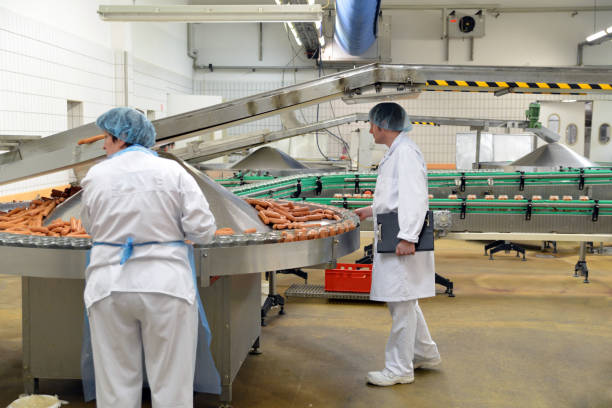Quality Control in The Food Industry Ensuring Food Safety
How Quality Control in the Food Industry Ensures Food Safety?
The food industry is a complex and highly regulated sector that plays a vital role in providing safe and nutritious products to consumers. Food industry quality control ensures the quality and safety of food products is not compromised at any cost. This is considered important not only to meet regulatory requirements but also to maintain consumer trust and protect public health. Quality control in food production is a comprehensive system of checks, procedures, and standards designed to guarantee that food products meet the necessary criteria for safety, quality, and consistency.
The Importance of Quality Control in the Food Industry
Quality control in the food industry is essential for several reasons:
Consumer Safety
This is essential to protect consumers from potential health hazards. Contaminated or adulterated food can lead to foodborne illnesses, which can have serious health consequences. Effective quality control measures help identify and prevent such risks.
Regulatory Compliance
The food industry is subject to stringent regulations and standards imposed by government agencies to ensure food safety. Compliance with these regulations is not only a legal requirement but also crucial for maintaining the integrity of the industry.
Brand Reputation
A single incident of food contamination or safety issues can tarnish a brand’s reputation irreparably. Consumers trust brands that consistently deliver safe and high-quality products. Food industry quality control safeguards brand reputation by reducing the likelihood of product recalls or safety breaches.
Consistency
The primary goal of quality control in food production is to ensure consistency. Quality control processes ensure that food products are consistent in taste, texture, and appearance. Consistency is essential for meeting customer expectations and building brand loyalty.
Waste Reduction
Quality control measures help identify and mitigate factors that can lead to food spoilage or waste. This not only reduces costs but also aligns with sustainability efforts to minimize food loss.
8 Key Components of Quality Control in the Food Industry
Quality control in the food industry involves various components and best practices to ensure the safety and quality of food products:
- Raw Material Inspection: The process begins with the careful inspection and testing of raw materials. This includes assessing the quality and safety of ingredients, packaging materials, and any other components used in food production.
- Good Manufacturing Practices (GMPs): GMPs are a set of guidelines and principles that govern the manufacturing process in the food industry. They cover aspects such as cleanliness, sanitation, equipment maintenance, and employee hygiene.
- Hazard Analysis and Critical Control Points (HACCP): HACCP is a systematic approach to identifying and controlling potential hazards in food production. It involves assessing every stage of the production process and implementing measures to mitigate risks.
- Quality Testing: Quality control laboratories conduct various tests on food products to assess their safety and quality. These tests may include microbiological, chemical, and physical analyses to detect contaminants, pathogens, or deviations from established standards.
- Packaging Control: Packaging materials play a critical role in maintaining food quality and safety. Quality control measures ensure that packaging materials are suitable for the intended purpose and do not pose any risks of contamination.
- Sensory Evaluation: Sensory evaluation involves assessing the taste, aroma, texture, and appearance of food products. Trained sensory panels or consumer taste tests help ensure that products meet taste and quality expectations.
- Traceability: Traceability systems enable the tracking of food products throughout the supply chain. This is vital in identifying the source of any quality or safety issues and facilitating recalls if necessary.
- Compliance with Regulations: Food manufacturers must stay updated on regulatory requirements and ensure strict compliance. Regular audits and inspections by regulatory authorities are common in the food industry.

5 Challenges in Implementing Quality Control
While quality control is essential in the food industry, it comes with its own set of challenges:
- Complexity of Supply Chain: The food supply chain is often long and complex, involving multiple suppliers, distributors, and retailers. Ensuring quality at every stage can be challenging.
- Variability in Raw Materials: Natural variability in raw materials, such as agricultural produce, can impact the consistency of food products. Quality control must account for this variability.
- Rapid Changes in Consumer Preferences: Consumer preferences and dietary trends can change rapidly. Adapting to these changes while maintaining quality standards can be demanding.
- Evolving Regulations: Food safety regulations and standards are subject to change. Staying current with regulatory updates and ensuring compliance is an ongoing effort.
- Global Sourcing: Many companies source ingredients globally, which adds complexity to food industry quality control due to varying regulations and quality standards in different countries.
Future Trends in Quality Control
The future of quality control in the food industry is likely to be shaped by several emerging trends:
- Enhanced Food Safety Measures: With the growing awareness of foodborne illnesses and contamination risks, the food industry will focus on even stricter food safety measures. This includes the integration of sensors and detectors that can quickly identify contaminants or pathogens in real-time, preventing contaminated products from reaching consumers.
- Data Analytics: Big data analytics will play a significant role in quality control. Predictive analytics can help identify potential issues before they escalate.
- Sustainability: Quality control will increasingly align with sustainability goals, focusing on reducing food waste and environmental impact.
- Automation and Robotics: The food industry is likely to see increased automation and the use of robotics in quality control processes. Robots can perform repetitive and precise tasks, such as sorting, inspecting, and packaging food products, with high accuracy. Automated systems can work around the clock, ensuring continuous monitoring and timely responses to deviations from quality standards.

Final Words
In conclusion, food industry quality control stands as an unwavering commitment to safeguarding the health and well-being of consumers. It ensures that every product that reaches our tables meets the highest standards of quality and purity. From advanced data analytics to sustainable practices, as technology evolves and consumer demands shift, the food industry must continually adapt and embrace emerging trends. With a dedicated focus on quality control in food production, the food industry not only safeguards public health but also sustains its reputation for delivering safe, nutritious, and delectable products that enrich our lives.
